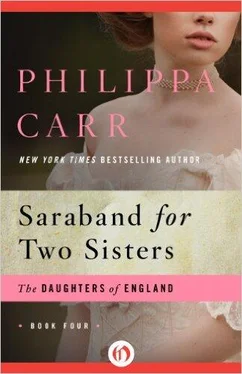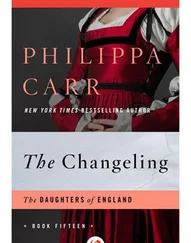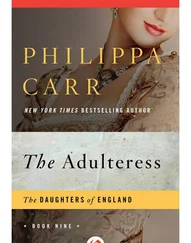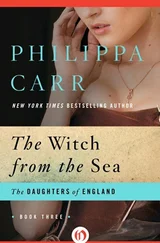Bersaba looked pretty on that morning. June is such a lovely month, when the hedges are gay with wild roses and lacey chervil while great clumps of yellow gorse brighten the downs and the red sorrel shows itself in the fields. She was wearing her dark red outer petticoats which we called safeguards and which we always wore for riding. I had put on my blue ones. Although we sometimes dressed alike we did not always wear identical clothes. There were occasions when we liked to because we took a mischievous delight in puzzling people. I could put on a good impersonation of Bersaba and she could of me. We used to practise sometimes, and one of the great jokes of our childhood had been to deceive people in this way. We would laugh until we were hysterical when someone said to her: ‘Now, Miss Angelet, it’s no use your pretending to be Miss Bersaba. I’d know you anywhere.’ It gave us a kind of power, as I pointed out to Bersaba. We could put it to good use on certain occasions. Well, on this day she wore her red so I wore my blue; our cloaks matched our safeguards and we each had brown soft boots. So there would be no danger in our being mistaken for each other on that journey. But when we were at Paling I knew we would wear identical clothes at times and enjoy deceiving them.
We rode one on either side of our mother. She was a little pensive. No doubt she would be thinking of our father and wondering where he was at that moment. There was always anxiety in her mind because so many dangers lurked on the high seas and she could never be sure whether he would come back.
Once I mentioned this to her, and she said that if she did not suffer these anxieties she could not be so happy when he did come home. We must always remember that life was made up of light and shadow and the light was the brighter because of the contrasting shadow. She was a philosopher, my mother; and she was always trying to teach us to understand and accept life as it was, because she felt such an attitude would be a cushion if ever misfortunes came to us.
If my father and brother had been riding to Castle Paling with us she would have been completely happy. I loved her intensely as we rode along and I started to sing in sheer thankfulness to God who gave her to me:
‘And therefore take the present time With a hey and a ho and a hey nonny-no
For love is crowned with the prime
In spring time …’
My mother smiled at me as though she shared my thoughts and she joined in the song and told the servants to do the same. Then we all took turns to sing the first line of a song of our choice and the rest of us would come in, but when it was Bersaba’s turn she sang alone because no one joined in with her. It was Ophelia’s song:
‘How should I your true love know From another one?
By his cockle hat and staff
And his sandal shoon
He is dead and gone, lady
He is dead and gone;
At his head a grass green turf,
At his heels a stone.’
Bersaba had a strange haunting voice, and when she sang those words I imagined her lying in the stream with her long dark hair floating round her and her face white and dead. There was something strange about Bersaba, something I didn’t understand, for all that she was said to be part of me. She had that quiet personality which seems not to intrude and yet can change the mood of all those around her.
She had made us forget the June morning, the sun, the flowers and the joys of living because she had reminded us of death. We stopped singing then and silently we rode on until the towers of the castle came into view.
The sun picked out the sharp points in the granite and made them glisten like little diamonds. It was indeed an impressive sight which never failed to thrill me. Defiant, bold, arrogant, the castle always seemed like a living thing to me, and I never failed to feel proud to be connected with it. Our house was mellow in a way, although its stones might well be as old as those of the castle—or almost; but Trystan seemed gentle, homely, when compared with Castle Paling. Its four battlemented towers proclaimed it for what it was, a fortress which had remained impregnable for six hundred years, for it had been built in the days of the Conqueror although it had been added to over the passing centuries. My imagination went into action every time I beheld it, and I could picture the defenders of the castle pouring boiling oil and arrows down on those who would assail it. There were marks on a heavy oaken door with its iron bands—the one which was below the gatehouse—which I was sure had been made by battering rams.
Approaching from the west, two of the towers were hidden from us—Ysella’s, which used to be said to be haunted, and Seaward, which was now haunted by Grandfather Casvellyn. I glanced at my mother. She had grown serious and I wondered what pictures the sight of that castle conjured up in her mind. One day I would read of her life there, which must have been very adventurous and unhappy too, for this must be the reason why she was so contented with the present.
Bersaba’s expression had changed too. Her profile was clear-cut; she had high cheek-bones and long eyes with golden lashes tipped with dark brown at the edges. I often looked at her and thought: in describing her I am describing myself, for I look the same—or almost. It was only our expressions which could change our faces, for the bone structure and the shape of our features were identical. Our mother had once said: ‘As you grow older you will look less alike. Experience changes faces and it is hardly likely that you will share the same.’
Now, I thought, we may be looking different because she changes when we are at Castle Paling. She is more remote and I almost feel she has succeeded in doing what she is always trying to—move away from me. There used to be times when I had known what she was thinking, but now she could shut me out, and when we went to Castle Paling it was almost as though she let down some sort of shutter. I often wondered what it was at Castle Paling that made her do that.
As we were riding under the portcullis and into the courtyard I heard Rozen’s voice shouting: ‘They’re here!’
And then there was Aunt Melanie with Melder and Gwenifer coming out of a side door of the castle. There followed the usual bustle while our horses were taken by the grooms and the maids took our baggage and we were embraced by everybody.
Then we went through the guardroom to the great hall on the stone walls of which were crossed halberds and pikes and several suits of armour which had been worn by our ancestors.
‘Come first into my parlour,’ said Melanie, ‘and then when you are refreshed you can go to your rooms. It is good to see you all. The twins look well.’ She smiled at us and I could see she did not know which of us was which.
Wine and cakes were already there in that chamber which she had made like the one at Trystan. I was always intrigued when I saw her and my mother together to contemplate that Aunt Melanie’s present home was my mother’s old one and vice versa.
We all seemed to talk at once and it was just like any other reunion.
We went to our rooms—Bersaba and I sharing as we always did, and Rozen and Gwenifer coming to help us unpack. Gwenifer talked a great deal about the balls that she had attended last season, for although she had not yet reached eighteen, as her elder sister was ‘out’ it was decided that she should join her. Rozen believed that George Kroll was going to speak for her, and although it was not a grand match it was one well worth considering.
‘There are so few people here,’ pouted Rozen. ‘How I wish we could go to Court!’
Court! The very word set us all dreaming of balls and banquets or glittering state occasions and elaborate costumes trimmed with exquisite lace.
Читать дальше











